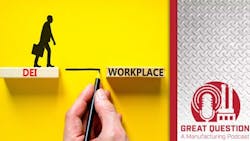Christie Smith founded The Humanity Studio, a multimedia leadership advisory company working to improve the way we live by revolutionizing the way we work. During her 30-year career, she has served as the global lead for talent and organization at Accenture, a senior executive at Apple, and managing principal at Deloitte.
See also: DEI hiring to overcome labor shortages
She has a doctorate in social work and organizational psychology, and she recently joined Adrienne Selko, the senior editor at EHS Today, a sister brand at Endeavor Business Media to Smart Industry, about the future of the embattled DEI movement and how companies need to manage their talent strategies now that pressure is on to dismantle their diversity programs.
Takeaways from this podcast:
- Each company should assess what its DEI are, the effectiveness of these programs, what the achievement of the strategy is, and whether the purpose of the organization is being lived.
- This isn’t the only time a dip in the focus of DEI has occurred, but it comes at a dangerous time, when the skills scarcity is increasing and the half-life of skills is getting shorter and shorter.
About the Podcast
Great Question: A Manufacturing Podcast offers news and information for the people who make, store, and move things and those who manage and maintain the facilities where that work gets done. Manufacturers from chemical producers to automakers to machine shops can listen for critical insights into the technologies, economic conditions, and best practices that can influence how to best run facilities to reach operational excellence.
Below is a partial transcript of this Great Question podcast:
Adrienne Selko: Many companies are changing the use of terms but embracing the tenets of DEI. One survey on this found that while 42% of the companies surveyed will change their initiatives, 73% are committed to DEI as part of their values. How do you feel about this trend?
Christie Smith: Yeah, not great. I think that the reality is that the kind of code-switching—listen, I'm really grateful that companies are at least talking about holding the value of DEI and continuing programs. What I think is concerning is that they are taking a much milder approach or giving up on really talking about the value of diversity, equity, and inclusion. I think that we have had a very up-and-down relationship with DEI programs and initiatives over the years.
Podcast: AI's role in Kaizen, Lean, technology and continuous improvement
This is not the only time we've seen a dip in the focus of DEI, but it comes at a very dangerous time. When we look at the skills scarcity, the half-life of skills getting shorter and shorter, when we look at the economic impact of employee disengagement being $8.8 trillion a year, when we look at mental health costing us $322 billion a year globally, we are really at a point where, you know, disengaging and giving up on these values and purpose in an organization—not speaking boldly and courageously about it—is really risking getting the right talent into our organizations to meet our productivity and growth goals.
AS: How would you answer companies who are questioning the legality of their programs?
CS: I think that each company is different, and I think that what would be required is an assessment of what those programs are, the effectiveness of the current programs, what the achievement of the strategy is, and whether the purpose of the organization is being lived. The performance context starts with purpose, and purpose informs strategy.
See also: AI as a catalyst for a workforce surge
So really delving deep into what is the purpose of the organization and the strategy of how we get there, and then looking at the culture and the skills that we need to achieve those goals really is how we then get to the discussion of building an inclusive, diverse, and equitable workforce. What does that look like for our efforts today? And how do we build it into the cultural fabric of an organization and the subcultures of that organization?
AS: You did mention some of the economic costs of employee engagement and mental health. Do you think that companies truly understand the connection between these costs and DEI?
CS: No. I've been in the workforce nearly 40 years, and always working in some aspect of DEI and talent, and the reality is, I've always been asked, you know, and diversity leaders are asked, "What's the business case?" I think that is a false start. If you have humans in the workplace and you need humans in the workplace, that’s the business case.
See also: Developing the technology behind Kubota's cutting-edge tractors
When I was at Apple, we adopted a kind of mission statement as the DEI group, and my role as the DEI officer was to look at and answer the question or promote, "It's everybody's job to bring everyone in." Full stop.
So, in order for us to look at the right skills, the right capabilities, all of those things that we needed, we needed the largest pool of talent that we could get to. Just sheer demographics. Especially in the U.S., we are more diverse than we've ever been.
And so, therefore, if we are going to grow as an organization, if we want revenue to double in percentage growth every year, then we need the right people in the right places to do that. We need the largest pool of people.
About the Author
Scott Achelpohl
Head of Content
I've come to Smart Industry after stints in business-to-business journalism covering U.S. trucking and transportation for FleetOwner, a sister website and magazine of SI’s at Endeavor Business Media, and branches of the U.S. military for Navy League of the United States. I'm a graduate of the University of Kansas and the William Allen White School of Journalism with many years of media experience inside and outside B2B journalism. I'm a wordsmith by nature, and I edit Smart Industry and report and write all kinds of news and interactive media on the digital transformation of manufacturing.

